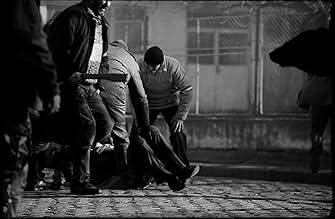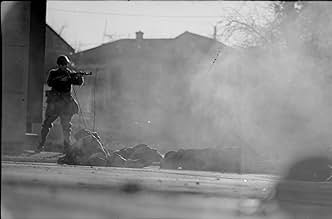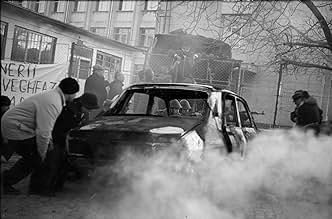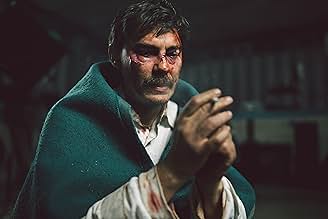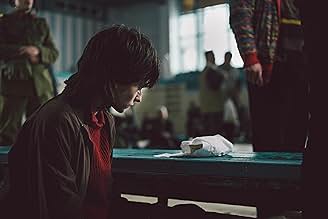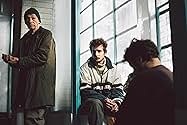Libertate
IMDb RATING
7.4/10
2K
YOUR RATING
During Romania's 1989 revolution, Sibiu witnesses a violent attack on a police station that spirals into armed clashes between soldiers, police, protesters and secret police.During Romania's 1989 revolution, Sibiu witnesses a violent attack on a police station that spirals into armed clashes between soldiers, police, protesters and secret police.During Romania's 1989 revolution, Sibiu witnesses a violent attack on a police station that spirals into armed clashes between soldiers, police, protesters and secret police.
- Director
- Writers
- Stars
- Awards
- 17 wins & 10 nominations total
- Director
- Writers
- All cast & crew
- Production, box office & more at IMDbPro
Featured reviews
10Tb59
I have just had the privilege of seeing this tonight, at a pre-screening before the actual launch and I can say I was very happy and relieved to see these stories told so well and yet also not be a documentary, in spite of the mountains of research and effort that went into recreating some of the aspects depicted. Probably the best and most mature non-meta Romanian film.
Please go out and support it by seeing it in cinemas, starting October 6th - it's well worth it and it deserves to be seen if you're even remotely interested in Romanian films, history inspired stories - or, indeed, great movies in general!
Please go out and support it by seeing it in cinemas, starting October 6th - it's well worth it and it deserves to be seen if you're even remotely interested in Romanian films, history inspired stories - or, indeed, great movies in general!
Romanian cinema, like a significant part of the Romanian society, is still obsessed with the events of December 1989, which led to the fall of communism. Romania was the last country among the former allies of the USSR in which this regime change took place and the only one in which the transition was violent. Neither historians nor courts nor ordinary people have yet given a clear verdict on those events: what really happened? Was there a popular uprising, a coup d'état, media stage, or a combination of all these? 'Libertate' ('Freedom'), the film directed by Tudor Giurgiu, focuses on what happened in Sibiu, a city that in 1989 had about 150 thousand inhabitants, located in Transylvania, in the geographical center of Romania. In a style that can be characterized as docu-drama, the film follows the struggles between the forces that until the eve had been allies in the preservation of communist order and legality, and which now find themselves - out of manipulation, out of inexperience, out of fear - engaged in - a violent conflict.
Tudor Giurgiu aimed and largely succeeded to create an immersive experience for the spectators, recreating the atmosphere of chaos in Sibiu on December 22, 1989 and in the ten days that followed. He created a gallery of characters in constant motion, most wearing army, militia or security forces uniforms. After some time, a few main characters emerge: Viorel Stanese - officer in the judicial militia who shows up for work and finds himself defending weapon in hand the institution's headquarters against an unclear enemy, Leahu - a taxi driver but perhaps also a security informant who finds himself with a gun in his hand at the wrong time, the army colonel Dragoman who evolves in days or maybe just hours from revolutionary to torturer. Almost all the characters had been collaborators and perhaps even profiteers of the old regime. The order imposed by the dictatorship collapses, everybody fears and suspects everybody else, some find themselves in the camp of the victors, others are categorized as 'terrorists' and become prisoners in a swimming pool emptied of water, along with some of the victims of the repression. In an anthological scene, protesting the conditions of detention, former militiamen and security officers chant 'Freedom!'. But what Freedom can we talk about after half a century of dictatorship? What does this word actually mean?
Tudor Giurgiu makes copious use, especially in the first part of the film, of the mobile camera, with the cameramen among the characters, in the crowds on the streets or next to the panicked officers in the besieged Militia headquarters. The second half of the film is spent most of the time in the structure of the swimming pool, an excellent visual metaphor of an enprisonment space. As things quiet down, so do the cameras and the cinematic style returns to a classic narrative. The swimming pool gradually empties as the prisoners are released, but the first to leave are those who agree to cooperate. The cast is excellent, the actors live their roles rather than act and the difference between documentary and fiction is almost completely erased. With this film, Tudor Giurgiu returns to the roots of Romanian history of the last 33 years. Without judging the characters and their actions and without taking explicit attitudes, he seems to suggest that the current disorientation of many segments of the Romanian society has its origin in the confusion of those December days. 'Libertate' is an intentionally chaotic film about those days of change that could have happened differently.
Tudor Giurgiu aimed and largely succeeded to create an immersive experience for the spectators, recreating the atmosphere of chaos in Sibiu on December 22, 1989 and in the ten days that followed. He created a gallery of characters in constant motion, most wearing army, militia or security forces uniforms. After some time, a few main characters emerge: Viorel Stanese - officer in the judicial militia who shows up for work and finds himself defending weapon in hand the institution's headquarters against an unclear enemy, Leahu - a taxi driver but perhaps also a security informant who finds himself with a gun in his hand at the wrong time, the army colonel Dragoman who evolves in days or maybe just hours from revolutionary to torturer. Almost all the characters had been collaborators and perhaps even profiteers of the old regime. The order imposed by the dictatorship collapses, everybody fears and suspects everybody else, some find themselves in the camp of the victors, others are categorized as 'terrorists' and become prisoners in a swimming pool emptied of water, along with some of the victims of the repression. In an anthological scene, protesting the conditions of detention, former militiamen and security officers chant 'Freedom!'. But what Freedom can we talk about after half a century of dictatorship? What does this word actually mean?
Tudor Giurgiu makes copious use, especially in the first part of the film, of the mobile camera, with the cameramen among the characters, in the crowds on the streets or next to the panicked officers in the besieged Militia headquarters. The second half of the film is spent most of the time in the structure of the swimming pool, an excellent visual metaphor of an enprisonment space. As things quiet down, so do the cameras and the cinematic style returns to a classic narrative. The swimming pool gradually empties as the prisoners are released, but the first to leave are those who agree to cooperate. The cast is excellent, the actors live their roles rather than act and the difference between documentary and fiction is almost completely erased. With this film, Tudor Giurgiu returns to the roots of Romanian history of the last 33 years. Without judging the characters and their actions and without taking explicit attitudes, he seems to suggest that the current disorientation of many segments of the Romanian society has its origin in the confusion of those December days. 'Libertate' is an intentionally chaotic film about those days of change that could have happened differently.
10AEA0258i
The movie had the right amount of everything, be it violence, humour, community, or politics. The revolution of '89 has many secrets still, but the director and scenographer Tudor Giurgiu did a tremendous job in order to keep the facts palpable. The casting was perfect and every line was fluid, believable, accurate for the time in question. The metaphors used make it not only an action movie, but a psychological one, shaping every character, with flaws and faults. And still, at the end of it you pity and cry along them and start questioning yourself if you would have done things differently. I can only hope it receives the recognition it deserves, because it is a masterpiece.
(I saw it at a pre-screening. The premier is on the 6th of October)
(I saw it at a pre-screening. The premier is on the 6th of October)
This movie is a technically well-done utter failure.
It exudes the hallmark of bad acting: actors shouting out their lines all the time. It presents the hallmark of a bad scenario: no conclusion, no catharsis.
I was there during that revolution. Everyone was trying to find out what would be next in for our destiny, if we'll end in the EU or the Russians will take over. People were trying to find out if their friends are alive, if they'll still have a job next day. Then came the summary process of the dictator on a Christmas Day (to be later followed by the Miner's revolts etc.). Nothing of this was a topic of the movie. A slapstic, one with a historically accurate scenography.
The marketing machine behind and the official endorsement made for a sold-out theatre. This is yet not on the same level with the new Romanian cinema which made a dent in the European cinema in previous years (4-3-2, Beyond the Hills, Aferim etc.). Not even on the same level with well-executed modern Romanian thrillers like Boss (2023).
It exudes the hallmark of bad acting: actors shouting out their lines all the time. It presents the hallmark of a bad scenario: no conclusion, no catharsis.
I was there during that revolution. Everyone was trying to find out what would be next in for our destiny, if we'll end in the EU or the Russians will take over. People were trying to find out if their friends are alive, if they'll still have a job next day. Then came the summary process of the dictator on a Christmas Day (to be later followed by the Miner's revolts etc.). Nothing of this was a topic of the movie. A slapstic, one with a historically accurate scenography.
The marketing machine behind and the official endorsement made for a sold-out theatre. This is yet not on the same level with the new Romanian cinema which made a dent in the European cinema in previous years (4-3-2, Beyond the Hills, Aferim etc.). Not even on the same level with well-executed modern Romanian thrillers like Boss (2023).
📽 "Libertate" magnificently directed by Tudor Giurgiu and masterfully written by him together with Cecilia Stefanescu and Nap Toader, is a historical drama inspired by the great mystery behind the events of the dark days of December 1989 in Sibiu, where the fall of the communist regime leads to bloody confrontations between soldiers, policemen, civilian protesters and representatives of the secret police, all resulting in unprecedented chaos. This film really succeeds in transposing the audience in the time-space line, but more importantly in the minds of the protagonists, questioning more than ever the value of moral ethics and the power to keep yourself clean in a dystopia full of corruption.
🎞 A special characteristic of the story is the directorial and acting power to present a blurred overall picture, capable of connecting the narratives of different, doubtful perspectives, thus leading the audience to crucial moments where they even doubt the veracity of the protagonists...captive too in a world ruled by fear and lies. A psychological study of a fractured mindset imposed by the failed ideologies of a flawed system, but also an enchanting story designed to leave the audience with questions and personal analyses, quite recent events leaving us as spectators in the position of questioning our own inner revolution. A film that leaves its mark on the audience for a long time, truly a cinematic masterpiece, the opportunity to reflect and thus better understand the past and implicitly the future!
🎞 A special characteristic of the story is the directorial and acting power to present a blurred overall picture, capable of connecting the narratives of different, doubtful perspectives, thus leading the audience to crucial moments where they even doubt the veracity of the protagonists...captive too in a world ruled by fear and lies. A psychological study of a fractured mindset imposed by the failed ideologies of a flawed system, but also an enchanting story designed to leave the audience with questions and personal analyses, quite recent events leaving us as spectators in the position of questioning our own inner revolution. A film that leaves its mark on the audience for a long time, truly a cinematic masterpiece, the opportunity to reflect and thus better understand the past and implicitly the future!
Did you know
- ConnectionsReferences Rocky (1976)
- How long is Freedom?Powered by Alexa
Details
Box office
- Gross worldwide
- $255,790
- Runtime1 hour 49 minutes
- Color
Contribute to this page
Suggest an edit or add missing content



